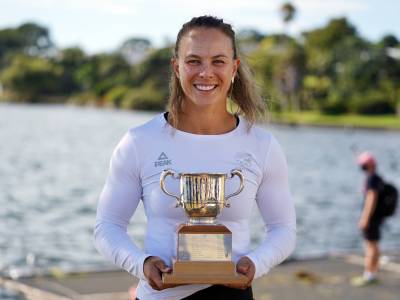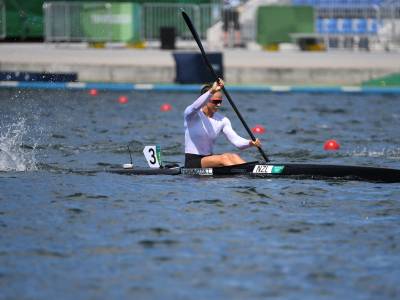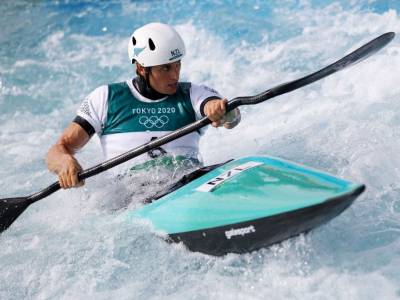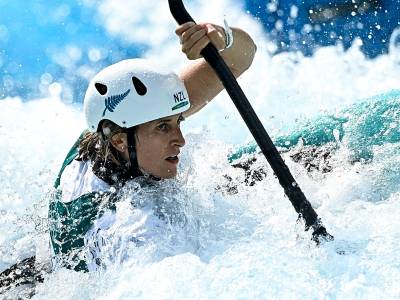It's been another busy month for Kiwi athletes on the world stage, as the countdown to Tokyo continues. The NZOC announced its long list of more than 1,000 athletes striving for Olympic qualification in 2020. This is a large number of athletes who are in the process of attempting to qualify for the Olympic Games. It's not only the 1,000 or so athletes who are attempting to qualify but also the families, coaches and other support people who are also doing everything possible to ensure New Zealand has a strong lineup in Tokyo come July 2020.
Successes over the past month have come in swimming where Lewis Clareburt won bronze in the 400m IM at the Swimming World Champs. Also at the Swimming World champs the women’s 4x200m freestyle team qualified a spot for New Zealand. In equestrian, New Zealand qualified a jumping team for Tokyo, and in sailing New Zealand won a quota spot in the women’s 470. New Zealand is now qualified in eight of the ten sailing classes for Tokyo.
New Zealand at the Olympic Games: Canoeing Overview
The focus on this month's blog is on the sport of canoeing. New Zealand first sent canoeists to the Olympic Games in 1972 in Munich. Donald Cooper finished fifth in his semi-final in the K1 1000m, and Cooper teamed up with Tom Dooney in the K2 1000m, where they also made the semi-finals.
Four years later in Montreal, New Zealand’s most successful Olympian Ian Ferguson competed for the first time in the K1 500m, and four years later Ferguson defied the New Zealand government’s wishes for New Zealand to stay away from the 1980 Olympic Games in Moscow and competed. Ferguson completed alongside three other athletes in 1980, including fellow canoeists Alan Thompson and Geoff Walker, and Modern Pentathlete Brian Newth. This time Ferguson reached the Olympic final, finishing 7th in the K1 500m and 8th in the K1 1000m. Thompson and Walker finished 8th in the K2 1000m.
In 1984 Ferguson was back for his third Olympic Games, alongside fellow Moscow Olympian Alan Thompson, and Paul McDonald and Grant Bramwell. It turned out to be third time lucky for Ferguson and the New Zealand canoeing team. On Lake Casitas, New Zealand would enjoy unprecedented success! Ferguson won three gold medals in Los Angeles, including two in one day. It was August 10, 1984, when Ferguson stunned the canoeing world to win gold in the K1 500m ahead of Moberg of Sweden and Bregeon of France. Within hours, Ferguson was back on the water with Paul MacDonald in the K2 500m, and it was another gold medal for New Zealand. The two gold medals won on August 10 were replicated a day later when Alan Thompson won gold in the K1 1000m, winning by more than a second. The final event of the regatta was the Ferguson K4 1000m where gold medalists Ferguson, MacDonald and Thompson teamed up with Grant Bramwell to dominate the final and winning the gold medal ahead of Sweden and France. New Zealand could barely believe what they had witnessed over those two days in Los Angeles. The four gold medals won, meant New Zealand finished as the best canoe/kayak nation at the 1984 Olympic Games.
Ferguson, MacDonald and Thompson were back four years later in Seoul and Ferguson, and MacDonald was once again in the medals. This time it was a rainbow of medals for New Zealand. MacDonald won bronze in the K1 500m, and then teamed up with Ferguson in the K2 events, winning silver in the K2 1000m, and gold in the K2 500m, narrowly winning gold over the USSR and Hungary. Alan Thompson finished 6th in the K1 1000m final. In 1988 Ferguson was given the honour of carrying the New Zealand flag at the Opening Ceremony.
Ferguson and MacDonald also competed at the 1992 Barcelona Olympic Games, finishing in 8th place in the K2 1000m. Also in Barcelona, Donald Johnstone became the first New Zealander to compete in the slalom events, finishing in 25th place in the K1 event. In Atlanta, Owen Hughes was the only New Zealander to compete in canoeing and finished in 31st place in the K1 slalom event. While no New Zealanders competed in canoeing in Sydney in 2000, New Zealand would well and truly stamp its mark on world canoeing when Ben Fouhy came from nowhere to win gold in the K1 1000m at the 2003 world champs. Fouthy went on to win silver at the 2004 Olympic Games in Athens. Fouthy also teamed up with Ian Ferguson’s son Stephen in the K2 1000m where they finished 8th in the final.
In Beijing in 2008, three Kiwi crews made Olympic finals with Ben Fouhy the best finisher, finishing 4th in the K1 1000m. Also in Beijing, the first female canoeists represented New Zealand with Erin Taylor finishing 5th in her semi-final of the women's K1 500m and Luuka Jones finishing 21st in the women’s K1 slalom event.
Four years later in London, Lisa Carrington became a household name in New Zealand. Carrington won gold in the K1 200m, beating rival Inna Osypenko-Radomska of Ukraine by over half a second. Carrington also teamed up with Erin Taylor to finish 7th in the K2 500m.
Carrington’s vice-like grip continued in the K1 200m remaining undefeated between Olympiads, and Carrington retained her Olympic title in Rio in 2016. Carrington also backed up her gold medal in the K1 200m with a bronze in the K1 500m. Luuka Jones at her third Olympiad also reached the dais, winning silver in the women’s K1 slalom event, New Zealand’s first medal in the slalom event.
Carrington remains dominant in the K1 200m and will be striving for a hat-trick of gold medals next year in Tokyo. Also, look out for the women’s K4 500m in Tokyo. After a 5th place finish in Rio, the team will be aiming for the dais. At the 2018 Canoeing World Champs, New Zealand won four medals in Olympic classes, with Carrington winning gold in the K1 200m. New Zealand will be looking for a repeat next year in Tokyo.
Tokyo 2020 Rio 2016 London 2012 Sydney 2000 Seoul 1988 Los Angeles 1984 Olympic Summer Games Lisa Carrington Luuka Jones Paul MacDonald Alan Thompson Ben Fouhy Ian Ferguson Steven FergusonTweet Share




